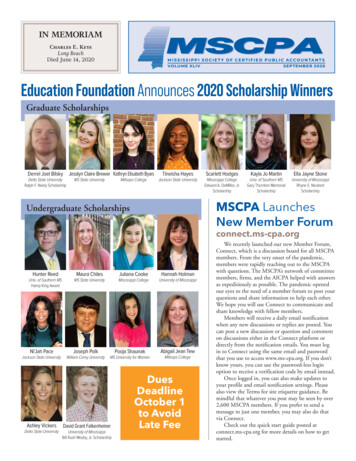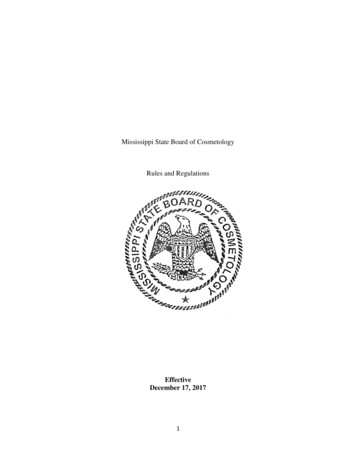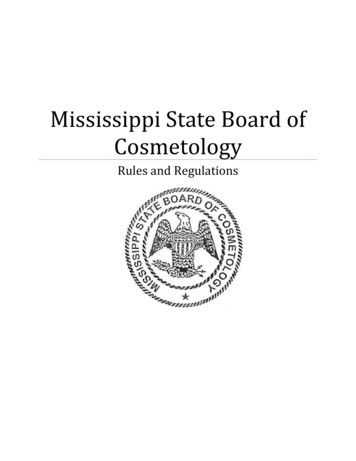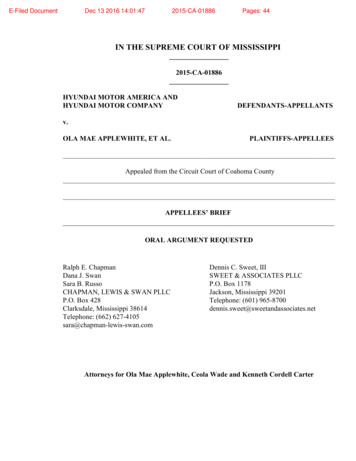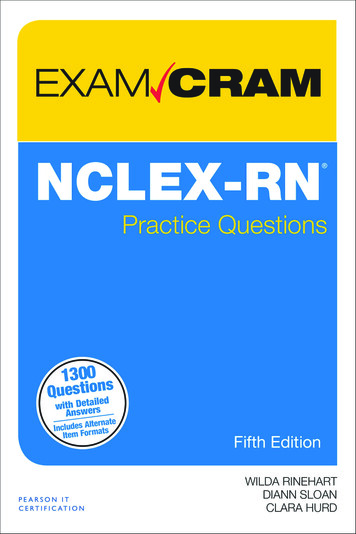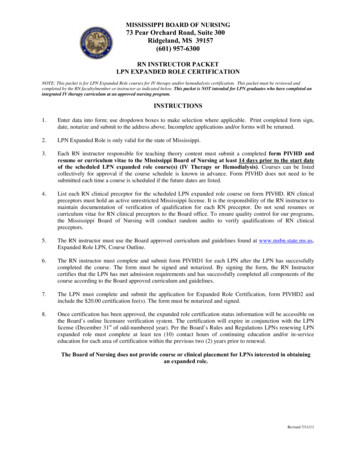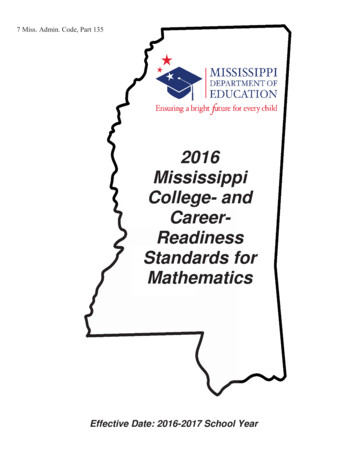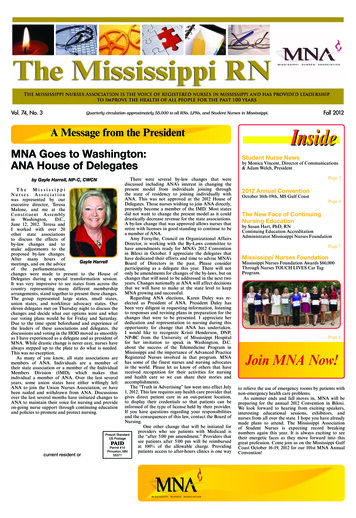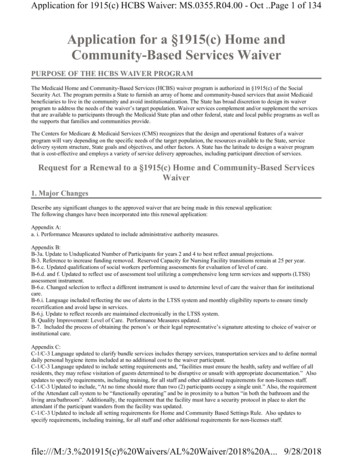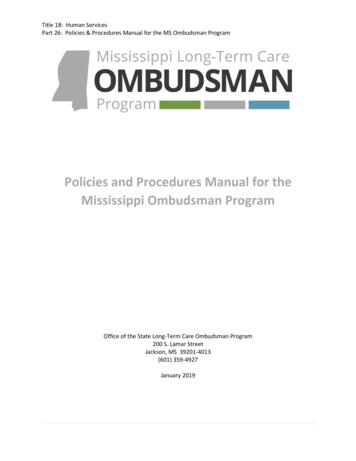
Transcription
Title 18: Human ServicesPart 26: Policies & Procedures Manual for the MS Ombudsman ProgramOffice of the State Long-Term Care Ombudsman Program200 S. Lamar StreetJackson, MS 39201-4013(601) 359-4927January 2019
TABLE OF CONTENTSPART I: INTRODUCTION TO THE LONG-TERM OMBUDSMAN PROGRAM SECTION A: General SECTION B: DefinitionsPART II: ADMINISTRATION OF THE LONG-TERM OMBUDSMAN PROGRAM SECTION A: Program StructureRole and Responsibilities of MDHS, Division of AgingRole and Responsibilities of Area Agencies on Aging (AAAs)Role of State OmbudsmanRole of District or Local Ombudsman SECTION B: Designation and Withdrawal of Designation ofOmbudsman Programs and OmbudsmenDesignation of Ombudsman ProgramsWithdrawal of Designation Ombudsman ProgramsDesignation of Long-Term Care OmbudsmenRefusal to Designate, Suspension of Designation, or Withdrawal ofDesignation of an Individual as a Long-Term Care Ombudsman SECTION C: ConfidentialityConsentDisclosure for Complaint Investigating PurposesDisclosure of Ombudsman Program RecordsAccess to FacilitiesAccess to Resident RecordsMail, Email and PhotographsSafeguarding Notes and Documentation SECTION D: Conflicts of InterestIdentifying a ConflictOrganizational ConflictsIndividual ConflictsRemoving or Remedying a ConflictFailure to Identify a ConflictPossible Remedies SECTION E: Legal Counsel and Legal Assistance Developer SECTION F: Interference and Retaliation SECTION G: Liability SECTION H: Grievance ProcessGrievance about Refusal, Suspension, or Removal of Designation ofa Local Ombudsman Entity (LOE) or a Representative of the OfficeGrievance about Actions of a Local OmbudsmanGrievance about a Volunteer OmbudsmanGrievance about Complaint InvestigationsGrievance about the Actions of the State Ombudsman SECTION I: Leave of Absence2 PagePAGE 8292929303132333334343435353536
PART III: TRAINING FOR OMBUDSMAN SECTION A: Designation Training SECTION B: Continuing Education TrainingPART IV: PROGRAM COMPONENTS FOR OMBUDSMAN PRACTICE SECTION A: Facility Visits SECTION B: Complaint ProcessingIntake of ComplaintsInvestigationVerification of ComplaintsResolution/Disposition of ComplaintsFollow-UpComplaint Referral Agencieso APS Referralo AG (Medicaid Fraud Control Unit) Referralo Health Department Referralo Legal Services Referral SECTION C: Documentation and Monthly ReportingDocumentation in WellSkyMonthly Reports SECTION D: Training to Local Ombudsman and Volunteers SECTION E: In-Service Education for Facility Staff SECTION F: Consultations for Facility Staff SECTION G: Information & Assistance/Consultations to Individuals SECTION H: Community Education SECTION I: Facility Surveys SECTION J: Resident Councils SECTION K: Family Councils SECTION L: Media and Monitoring Law & RegulationsMediaMonitoring Law & Regulations SECTION M: Facility Closures and BankruptcyFacility ClosuresBankruptcy SECTION N: Volunteers SECTION O: Pre-Survey Information SECTION P: Advisory Council SECTION Q: Fiscal Management3 PagePAGE 515253535454545555555657575757
PART I: Introduction to the Long-Term Ombudsman ProgramSECTION A: GeneralPurpose of the ProgramThe Mississippi Department of Human Services (also called the Council on Aging) has established theindependent organizational unit called the Office of State Long-Term Care Facilities Ombudsman(OSLTCO) within the Division of Aging and Adult Services (DAAS) which shall provide programmanagement and implementation of the State Ombudsman Program. The Mississippi Long-Term CareOmbudsman Program (LTCOP) provides services to protect the health, safety, welfare and rights ofresidents in long-term care facilities. The LTCOP investigates complaints and seeks resolutions that upholdthe dignity and safety of the individual resident. Ombudsmen advocate for and on behalf of long-termcare residents to improve their quality of care and quality of life.Ten (10) local ombudsman programs are located throughout the state in the ten (10) Planning andDevelopment Districts. In most areas, the administration of these local programs is through the AreaAgencies on Aging (AAA), to provide, either directly or through a subcontract, ombudsman services at thelocal level. Within each local ombudsman program, the designated ombudsmen are responsible forProgram Components. There must be a minimum of one full-time district ombudsman for each AreaAgency on Aging. However, there must be sufficient ombudsmen staff to achieve Program Componentsthroughout the planning and service area and sufficient travel funds to provide residents with regular andtimely access to the Ombudsman Program. In addition, the residents and complainants must receivetimely responses to requests for information and complaints.EligibilityAny Mississippian, regardless of age, who resides in or who is a potential resident of a long-term carefacility which is subject to regulation or licensure by the Mississippi State Department of Health (therefore,it may include an illegal unlicensed facility), shall be eligible for ombudsman service. The Mississippi StateDepartment of Health regulates Nursing Homes, Personal Care Homes-Assisted Living and Personal CareHomes-Residential Living.Philosophy of the ProgramThe LTCOP is a resident-centered advocacy program. Therefore, the wishes of the resident are theprimary concern regardless who is the complainant. The ombudsman will make every reasonable effortto assist, represent and intervene on behalf of the resident.4 Page
Legal Authority of the ProgramThe Mississippi Office of the State Long-Term Care Ombudsman Program is authorized by both state(Long-Term Care Facilities Ombudsman Act in §43-7-51 through §43-7-79 of the Mississippi Code) andfederal law (Older Americans Act, Public Law 89-73, Older Americans Act of 1965, as amended throughPublic Law 114-144, enacted April 19, 2016, 42 U.S. Code Chapter 35). The Long-Term Care OmbudsmanProgram Final Rule is codified in 45 CFR 1324. It is a federal regulation on how to carry out the OAA. TheNursing Home Reform Law of 1987 (OBRA ’87) and revised regulations in 42 CRF 483 are also veryimportant as they provide two key provisions:Quality of Care:Each resident must receive and the facility must provide, the necessary care andservices to attain or maintain the highest level of physical, mental and social wellbeing as listed in the resident’s care plan.Quality of Life:Facilities must care for residents in a manner and in an environment thatmaintains or enhances each resident’s quality of life.Unit of ServiceA unit of service equals one client hour and includes all activities carried out by the Ombudsman whichrelate to client service, training, and program management activities. Examples include the time spenton complaints/concerns made by or on behalf of a current or potential long-term care resident, theplanning and implementation of public workshops on long-term care issues, attending training workshopsfor ombudsman and the completion of ombudsman reports. This does not include time spent completingtime sheets or travel vouchers.ApplicabilityThese policies and procedures govern the actions of the Mississippi Office of the State Long-Term CareFacilities Ombudsman, designated district, local and volunteer ombudsman, provider agencies, AreaAgencies on Aging (AAA), Mississippi Department of Human Services Division of Aging and Adult Services(DAAS) and other parties involved in the operation of the Mississippi Long-Term Care OmbudsmanProgram.5 Page
PART I: Introduction to the Long-Term Ombudsman ProgramSECTION B: DefinitionsAbuse: Negligent or willful infliction of injury, unreasonable confinement, intimidation, or cruelpunishment with resulting physical harm, pain, or mental anguish; or deprivation by a person, including acaregiver, of goods or services that are necessary to avoid physical harm, mental anguish, or mental illnessor sexual abuse.ADL: Activities of Daily Living, including but not limited to, bathing, walking, excretory functions, feeding,personal grooming, and dressing. These have been revised to: mobility/ambulation; community mobility;transferring; eating and meal preparation.Advanced Health-Care Directive (AHCD): Designating an agent to make health-care decisions. MS has theUniform Health-Care Decisions Act in §41-41-201 through §41-41-229 of the MS Code which combinesthe power of attorney for health care along with a living will. An example is provided in §41-41-209.Advisory Council: This group provides guidance and advice to the SLTCO in order to enhance theeffectiveness of the statewide LTCOP. Each AAA has an Advisory Council.Area Agency on Aging (AAA): An agency designated by the DAAS to arrange for providing the agingservices in its planning and service area (PSA). There are 10 AAAs in Mississippi that contract with DAASto provide services under Title III and Title VII of the OAA.Area Plan: A plan developed by AAA for its relevant planning and service area as required by the OlderAmericans Act (OAA) §306.Assisted Living Facility (ALF): Facility that provides personal care and the addition of supplementalservices to include, but not be limited to, the provision of medical services (i.e., medication proceduresand medication administration) and emergency response services. These are for individuals who want tomaintain some level of independence, but require support with activities of daily living (ADLs).Case: Each inquiry brought to, or initiated by, the ombudsman on behalf of a resident or group ofresidents involving one or more complaints relating to the health, safety, welfare, or rights of residentswhich requires opening a case and includes ombudsman investigation, strategy to resolve, and follow-up.One or more complaints constitutes a case. You cannot have a case without a complaint.Certification: The designation provided by the State Long-Term Care Facilities Ombudsman to anindividual who meets minimum qualifications, is free of conflicts of interest, and has successfullycompleted training and other criteria stipulated in the Certification Requirements for the MississippiOmbudsman Program. Designation authorizes such individual to act as a representative of the Long-TermCare Ombudsman Program. An ombudsman (even a volunteer) shall not be authorized to investigate acomplaint without being certified by the State Long-Term Care Facilities Ombudsman.Closed Case: A case is where none of the complaints within the case require any further action on the partof the ombudsman and every complaint has been assigned the appropriate disposition code.6 Page
Community Education: Presentations to community groups, other agencies or professionals or to groupsof residents or families (other than resident & family councils) on long-term care issues. Each Ombudsmandistrict is required to do two community education events each federal fiscal year.Complaint: A concern brought to, or initiated by, the ombudsman for investigation and action by or onbehalf of one or more residents of a long-term care facility relating to the health, safety, welfare or rightsof a resident. One or more complaints constitutes a case. You cannot have a case without a complaint.Complainant: An individual who lodges a complaint. This could be a resident, family member, facilitystaff, ombudsman, banker, police officer, social worker, etc.Conservator: An individual appointed by the Court to make financial decisions for and exercise the legalrights and powers of an adult where the adult lacks sufficient capacity to make or communicate significantresponsible decisions concerning the management of his or her property. A conservator has priority overthe power of attorney agent. See §93-13-251 through §93-13-267 of the MS Code.Consultation: Means providing information and technical assistance to facilities and individuals regardinglong-term care issues. It is often by telephone. It does not involve investigating and working to resolve acomplaint (a consultation is not a case, therefore, isn’t a complaint). If you refer someone to anotheragency and are not actively involved in investigating and working to resolve the problem, it is not a caseor complaint. However, it is counted as a consultation.Designation: Status which authorizes an individual (whether a district or local ombudsman or volunteer)to act as a Representative of the Office. Said individual has successfully completed the trainingrequirements and is also free of conflicts of interest.District Ombudsman: An ombudsman who acts in a supervisory position over local ombudsman in theirrespective AAA region. There are currently 10 district ombudsmen in the Mississippi Long-Term CareFacilities Ombudsman Program.Exploitation: The illegal or improper act or process of an individual, including a caregiver, using theresources (money, assets, property) of an older or vulnerable individual for monetary or personal benefit,profit or gain without the informed consent of the resident.Family Council: Family members of residents and/or facility staff that meet regularly where theombudsman can provide technical assistance, information, training and support.Guardian: An individual or entity appointed by the Court to make personal and/or property decisions forand exercise the legal rights and powers of an adult where the court finds the adult lacking sufficientcapacity to make or communicate significant responsible decisions concerning his or her health or safety.Even residents who have been adjudicated incapacitated and to whom a guardian has been appointedretain some rights. These residents need to have their desires and preferences considered even if theguardian has the legal responsibility over that decision.Immediate Family: A member of the household or adult relative with whom there is a close personal orsignificant relationship. Examples include father, mother, son, daughter, brother, sister, aunt, uncle, first7 Page
cousin, nephew, niece, wife, husband, father-in-law, mother-in-law, son-in-law, daughter-in-law, brotherin-law, sister-in-law, stepparent, stepbrother, stepsister, stepchild, half-sister, half-brother, grandparentor grandchild. This definition is limited to conflict of interest only.Information & Assistance: Services which provide information to individuals on long-term care or theneeds/rights of long-term care residents.In-Service Education to a Facility: Presentations to long-term facility staff on long-term care issues. EachOmbudsman district is required to do five (5) In-Service Education seminars per federal fiscal year.Legal Representative: An agent under a valid power of attorney, provided that the agent is acting withinthe scope of his or her agency; an agent under a durable power of attorney for health care or health careagent under an advance health care directive; or an executor or administrator of the estate of a deceasedresident. Residents who have a legal representative with decision-making power retain their ability toparticipate in their own care and to exercise their rights.Local Long-Term Care Ombudsman: An individual designated by the SLTCO to be an advocate for residentsin long-term care facilities to protect their health, safety, welfare and rights.Long-Term Care: Refers to extended medical and social services required by people with chronicconditions to help them live as independently as possible despite significant challenges. It may bedelivered in community settings (adult day care), institutionalized settings (nursing homes) or informalsettings (home of friends or family).Long-Term Care Facility: Any skilled nursing facility, extended care home, intermediate care facility,personal care home or boarding home which is subject to regulation or licensure by the State Departmentof Health (Mississippi Code §43-7-55).Neglect: It is the failure to care for a person in a manner which would avoid physical or emotional harmor pain, or the failure to react to a situation which may be harmful. It may or may not be intentional.Not Verified: It is determined after work (interviews, record inspection, observations, etc.) that thecircumstances described in the complaint are not accurate.Office of State Long-Term Care Facilities Ombudsman: Organizational unit in MS which is led by the StateLong-Term Care Ombudsman. The organizational unit consists of the SLTCO only.PNA (Personal Needs Allowance): After an applicant is determined eligible for Medicaid in a nursingfacility, the individual is required to pay toward the cost of their care if income allows. This is referred toas Medicaid Income. It is total income less allowable deductions. PNA is one such deduction. It iscurrently 44 per month. Veterans and surviving spouses who receive a 90 VA pension get a 90 PNA.Medicaid Income is not paid by a HCBS participant.Representatives of the Office: District, local or volunteer ombudsmen selected by an area agency on agingwho have been designated by the State Ombudsman to act as resident advocates on behalf of the state.8 Page
Resident: Any resident, prospective resident, prior resident or deceased resident of any long-term carefacility, regardless of age.Resident Council: Residents of long-term care facilities and/or facility staff that meet regularly to discussissues relating to their care and quality of life. Assisted living facilities are not required by federal law tofacilitate meetings, unlike nursing homes.Resident Representative: means either:(1) an individual chosen by the resident to act on his or her behalf concerning decisions, accessing medicalor other personal information, managing financial affairs and receiving notifications;(2) a person authorized by State or Federal law (including agents under a power of attorney) to act on theresident’s behalf concerning decisions, accessing medical or other personal information, managingfinancial affairs and receiving notifications;(3) Legal representative; or(4) Court-appointed guardian or conservator of the resident.Resolved: This is how the complaint has been resolved depending on the resident’s satisfaction. It caneither be partially resolved, not resolved or resolved to the satisfaction of the resident.Skilled Nursing Facility (SNF): Facility in which medical care must be provided 24-hours by trainedindividuals, such as a registered nurse and physical, speech and occupational therapists. Examples ofskilled nursing services include wound care, intravenous (IV) therapy, injections, physical therapy, andmonitoring of vital signs & medical equipment.State Long-Term Care Ombudsman (SLTCO): An individual who is the head of the Ombudsman Programfor the State of Mississippi on a full-time basis to fulfill the duties and responsibilities of Older AmericansAct. Said individual is responsible for ensuring that all residents of long-term care facilities in Mississippihave adequate access to the services of the LTCOP and that each AAA has at least one designatedombudsman.Systems Advocacy: Activities which support and promote issues which benefit a group of long-term careresidents.Volunteer Ombudsman: An individual over 18 years old who has completed a Certification Trainingprescribed by the State Ombudsman Program and is designated to act as a representative to participatein the ombudsman program.Willful Interference: means the actions or inactions taken by an individual in an attempt to intentionallyprevent or interfere with the State Ombudsman Program from performing any of their functions or duties.WellSky: The statewide reporting system used to collect data relating to complaints, consultations,training provided, and other activities of the ombudsman program. This data is used when submitting theNORS annual report to the AOA. It is due by January 31st of each year and represents information fromthe previous federal fiscal year (Oct. 1st-Sept. 30th).9 Page
PART II: Administration of the Long-Term Ombudsman ProgramSECTION A: Program Structure Role and Responsibilities of Mississippi Department of Human Services, Division of AgingPursuant to the federal Older Americans Act and state law, the Mississippi Department of Human ServicesDivision of Aging and Adult Services (DAAS) has established the Office of the State Long-Term CareOmbudsman (OSLTCO). The Office of the State Long-Term Care Ombudsman is independent in itsrepresentation of the interests of long-term care facility residents, without representing the positions orpolicies of the Division of Aging and Adult Services, the Mississippi Department of Human Services, or anyother governmental entity. The Mississippi Department of Human Services, Aging and Adult Services, will:a) Provide for a full-time State Long-Term Care Ombudsman (SLTCO);b) Provide supervision of the SLTCO without interfering with its work to promote the interests oflong-term care facility residents;c) Not have personnel policies or practices which prohibit the Office of the State Ombudsman fromperforming the functions and responsibilities under the Ombudsman Final Rule as set forth in 45CFR §1324.13 or from adhering to the access, confidentiality and disclosure requirements ofsection 712 of the OAA;d) Provide the SLTCO with administrative support for personnel, fiscal, contractual, data, andbudgetary management, including administration of contracts for the LTCOP and between theDAAS and area agencies on aging (AAAs) and/or designated provider agencies;e) Provide funding for a statewide Long-Term Care Ombudsman Program (LTCOP) in accordancewith the OAA and through application of a statewide allocation formula approved by the SLTCO,within appropriations specifically designed for the SLTCO;f) Provide the SLTCO with authority to manage funds designated for the LTCOP;g) Provide opportunities for training Office of the State Long-Term Care Facilities Ombudsman andthe Representatives of the Office of the State Long-Term Care Facilities Ombudsman and may usefunds appropriated under Title III and/or Title VII of the Older Americans Act;h) Monitoring the SLTCOP by ensuring that the State Ombudsman Program complies with the OAAand the Final Rule;i) Ensure that the Ombudsman Program has sufficient access to residents, facilities and informationto do their duties;j) Combine the goals and objectives of the OSLTCO into the state and area plans on aging;k) Provide elder rights leadership by coordinating Ombudsman program services with otherprograms authorized by Title VII of the OAA;l) Provide adequate legal counsel to the Ombudsman Program that is free of conflicts of interest;m) Ensure that any review of files, records or other information maintained by the OmbudsmanProgram is consistent with the disclosure limitations as set forth in 45 CFR §1324.11(e)(3) and1324.13(e).n) Require the OSLTCO to prepare an annual report for the AoA/ACL;o) Refrain from interference with the LTCOP’s mandate to advocate for and represent the interestsof long-term care facility residents; andp) Require the OSLTCO to fulfill its duty of systems advocacy as the State Ombudsman deems isappropriate, regardless of State lobbying laws.10 P a g e
Role and Responsibilities of Area Agencies on Aging (AAAs)The Area Agencies on Aging or other provider agencies must assure:a) They are responsible for personnel management, but not the programmatic oversight, of theRepresentatives of the Office;b) They maintain separate budget and expenditure accounting for the Ombudsman Program and itis made available to the State Ombudsman upon request;c) That funds obtained from all sources related to the LTCOP are available and used for the program;d) They will follow strict confidentiality requirements in handling and storing all information andrecords (paper and electronic), telephone communication and internal communication within theorganization so as to avoid any conflicts of interest;e) That no resident-identifying information shall be disclosed to individuals outside of theOmbudsman Program;f) That there is a Memorandum of Understanding (MOU) between the local LTCOP and the Title IIIBLegal Services or an alternative written arrangement for providing advice and counsel to LTCOPand residents of LTC facilities;g) That neither the Ombudsman nor the AAA staff is subject to a conflict of interest, in particularthat the organization itself, its board members, advisory council members, employees andvolunteers do not derive personal or economic gain from LTC facilities or their associations. Anannual Conflict of Interest screening tool must be completed and sent to the State Ombudsmanon or before October 31s;h) Coordination with the State Ombudsman in the employment process or appointment ofRepresentatives of the Office of the Long-Term Care Facilities Ombudsman by ensuring thatapplicants do not have an individual conflict of interest as determined by the State Ombudsman;i) All Ombudsman Programs must follow the Mississippi Ombudsman Program’s Policies andProcedure Manual, in particular the Program Components for Ombudsman Practice;j) That the local ombudsman program abides by the complaint priority guidelines established by theOffice of the State Long-Term Care Ombudsman as set forth in the Mississippi OmbudsmanProgram’s Policies and Procedure Manual;k) That a minimum of one on-site visit is conducted per month to each long-term care facility locatedin the AAA’s Service Area. Complaint related visits should be in addition to routine visits. If afacility is not legally licensed, but should be in accordance to §43-11-1 et seq of the MS Code, thatfacility remains within the jurisdiction of the Ombudsman Program. There must be sufficientombudsman staff to achieve Program Components and sufficient travel funds to cover thesevisits;l) Assure LTCO staff attendance at annual designation training and all other statewide LTCO trainingprograms in addition to any required meetings with the State Ombudsman;m) Each local LTCOP shall create and maintain a current plan for recruitment, training and supervisionof volunteer ombudsman; andn) There are no personnel policies or practices which prohibit the Ombudsman Program fromperforming the duties and functions under the Ombudsman Final Rule as set forth in 45 CFR§1324.19 or from adhering to the requirements of section 712 of the OAA.11 P a g e
Role of State OmbudsmanThe State Ombudsman shall serve on a full-time basis to personally or through Representatives of theOffice perform the functions and duties according to state and federal law. The State OmbudsmanProgram shall provide services to protect the health, safety, welfare and rights of residents in long-termcare facilities. The State Ombudsman shall have training or experience in the field of long-term care andadvocacy, negotiation and problem resolution skills, leadership and program management skills, andconsumer-oriented public policy advocacy. The Office of the State Ombudsman shall be under the directsupervision of the Director of the Division of Aging and Adult Services. The State Ombudsman shallprovide leadership and monitoring, including fiscal management and performance monitoring, of theMississippi Long-Term Care Ombudsman Program. The SLTCO shall assure that all residents of long-termfacilities in the State have access to the services of the Mississippi Ombudsman Program (LTCOP) and thatthere is a designated ombudsman in each service area in the state. The SLTCO is responsible for providingleadership for the statewide Long-Term Care Ombudsman Program. Duties of State Long-Term CareFacilities Ombudsman shall include:1) Being responsible for oversight of the development and updating the requirements for theOmbudsman program by providing programmatic management of the Office which includesdeveloping policies, procedures, and standards for the administration of the LTCOP and LTCOpractice;2) The State Ombudsman shall coordinate, where applicable, through area agency on aging plans toapprove the contracts or plans of the Representatives of the Office of the State Long-Term CareFacilities Ombudsman and to regularly monitor their program performance. State Ombudsmanshall provide oversight of the quality and program operation of the Representatives of the Officeof the State Long-Term Care Facilities Ombudsman. However, wherever the Representatives ofthe Office of the State Long-Term Care Facilities Ombudsman is organizationally located, thatagency shall be responsible for personnel management;3) Monitoring the Representatives of the Office which includes the following: reviewing monthlyreports and data entry, one on-site visit per year to each district and fiscal management;4) Personally, or through Representatives of the Office, identify, investigate and resolve complaintsmade by or on behalf of residents in long-term care facilities that affect the health, safety, welfareand rights of residents in long-term care facilities;5) Ensuring that residents have regular and timely access to the services provided through the Officeand such residents and other complainants received timely responses to their complaints fromthe Representatives of the Office;6) Ensuring that the LTCOP is representing the interests of residents before governmental agencies;7) Informing residents how to obtain services through the Ombudsman Program;8) Being responsible for monitoring the files, records and other information of the OmbudsmanProgram;9) Prohibiting inappropriate disclosure of the identity of any complainant or resident with respectto LTCO files, records, or other information;10) Implementing a proper record maintenance system wherein all the files, records and otherinformation of the State Ombudsman Program, whether in physical, electronic or other format,shall be the property of the Office of the State Long-Term Care Facilities Ombudsman. Suchrecords are the property of the SLTCO and may not be released, disclosed, duplicated or removedwithout the written permission
facility which is subject to regulation or licensure by the Mississippi State Department of Health (therefore, it may include an illegal unlicensed facility), shall be eligible for ombudsman service. The Mississippi State Department of Health regulates Nursing Homes, Personal Care Homes-Assisted Living and
